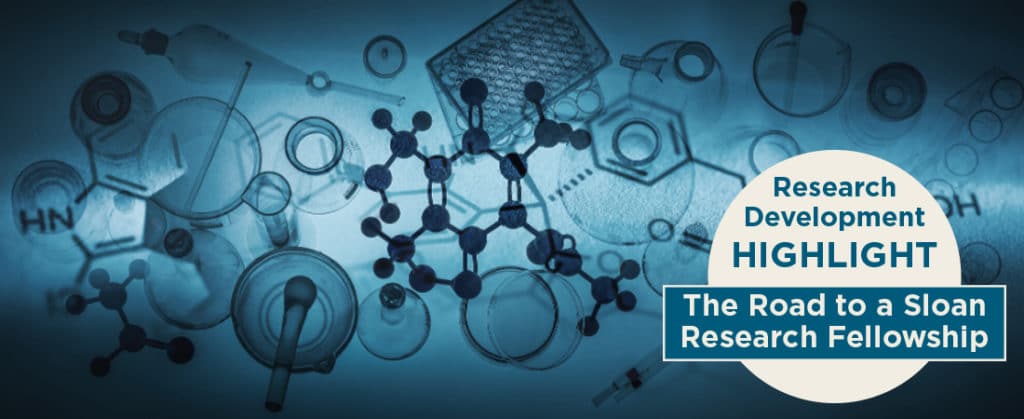 Mahshid Ahmadi, assistant professor of materials science and engineering in the Tickle College of Engineering (TCE), is teaching robots to synthesize new materials in a smart way – she calls it the automated lab. One of her goals is to find cost effective and environmentally stable photovoltaic materials to replace expensive silicone. Recently, Ahmadi leveraged this work to win a Sloan Research Fellowship from the Alfred P. Sloan Foundation.
Mahshid Ahmadi, assistant professor of materials science and engineering in the Tickle College of Engineering (TCE), is teaching robots to synthesize new materials in a smart way – she calls it the automated lab. One of her goals is to find cost effective and environmentally stable photovoltaic materials to replace expensive silicone. Recently, Ahmadi leveraged this work to win a Sloan Research Fellowship from the Alfred P. Sloan Foundation.
This assistant professor of materials science and engineering (MSE) at the University of Tennessee was recently recognized for her efforts by the Alfred P. Sloan Foundation with a Sloan Research Fellowship.
Approximately 125 of the prestigious, two-year $75,000 Sloan Research Fellowships are awarded annually to early career researchers recognizing distinguished performance and a unique potential to make substantial contributions to their field.
“I have a passion for doing this work to the benefit of Mother Earth,” Ahmadi said. Her unique approach combines machine learning and automated synthesis to more effectively develop complex materials,.
“It’s a simple and inexpensive approach, but the number of possible compositions and ways to synthesize them is immense,” she explained. Ahmadi uses machine learning to uncover the useful behaviors within large compositional spaces of metal halide perovskite for solar cells and monitor how changes to the material’s structure affect those behaviors.
Typically, the trial-and-error optimization takes years to complete, Ahmadi explained. However, with robotic synthesis, she can create hundreds of compositions in a day, increasing new discoveries by several orders of magnitude. In addition to solar-related materials, she could also discover new materials with other applications, such as in light emitting diodes (LEDs), photo detectors, and radiation detectors.
“For example, this could result in the next generation of semiconductor materials, replacing silicone in our electronics,” noted Ahmadi. “This research is sparking a new area of scientific exploration, targeting one of the most complex challenges in materials discovery and optimization, and I aim to be at the forefront.”
Ahmadi was supported by several research development team members during the Sloan Fellowship application process. She worked with both Jennifer Webster, interim research development director, and Hannah Schmidt, research development manager, who manage the annual competitive nomination process for prestigious fellowships and awards at UT. Schmidt connected Ahmadi with Alan Rutenberg, research development manager, who works with faculty pursuing fellowships and other prestigious awards.
“I first met Alan several years ago when he met with junior faculty from the Tickle College of Engineering to explain what he does. He is very, very experienced and understands the various funding opportunities quite well. His advice was extremely helpful,” Ahmadi said of the fellowship application development process.
After sharing her first draft, Rutenberg helped her rewrite it to reflect the priorities of the Sloan Foundation. He was able to share a sample application and draw upon his experience from previous Sloan Foundation applications. He noted that Karen Lloyd, associate professor of microbiology, received a Sloan Research Fellowship several years ago. Lloyd was the first faculty member in 30 years to be awarded the fellowship.
“I explained to both Karen and Mahshid the unique expectations of this competition,” Rutenberg recalled. “For example, in all areas of this program, applicants are expected to be distinctive and have high expectations. The program is intended to identify promising junior faculty who can both advance their field and their research plans,” Rutenberg said. Because of this he encourages faculty to be bold in their applications as they highlight their work history.
Ahmadi advises other UT engineering faculty to reach out to research development staff, both in the Office of Research, Innovation and Economic Development and in their various colleges, to take advantage of their specialized insights. In addition to praising the services of Rutenberg and Schmidt, she recommended Harry Richards, research and proposal development coordinator for TCE. “He’s very professional and has helped me shape the structure of my proposals.”
Rutenberg noted it is exciting to have two Sloan Research Fellows recognized at UT within six years and suggested that UT is developing a significant cohort of junior faculty in STEM fields. He added that he and others in research development stand ready to support faculty in developing targeted award proposals. For more information, please send an email to avcrd@utk.edu.
Ahmadi joined UT in 2015 as a postdoctoral researcher and moved up the ranks to tenure-track assistant professor in 2019. She works with research colleagues in MSE and Oak Ridge National Laboratory aiming to accelerate the discovery rate for metal halide perovskite materials by laboratory robotics systems. She is also a recipient of 2021 NSF Early Career Award.
